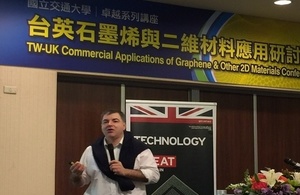UK Graphene and Other 2-Dimensional Materials Mission to Taiwan
UK Graphene and Other 2-Dimensional Materials Mission to Taiwan from 21-23 December 2015

Professor Sir Konstantin Novoselov
The British Office, working with Oxford Instruments, organised a mission by Nobel Laureate, Professor Sir Konstantin Novoselov, and leading UK scientists from the National Graphene Institute at the University of Manchester and the Cambridge Graphene Centre to explore opportunities to work with Taiwan in this exciting and fast-moving field.
In 2004, Professor Novoselov along with his colleague Professor Andre Geim isolated graphene for the first time at the University of Manchester, a scientific achievement that led to them receiving the Nobel Prize in Physics in 2010 for their pioneering work.
The high-profile mission is a core part of the year-long British Office “Technology is GREAT” campaign which aims to showcase the UK’s technological strengths and promote opportunities for scientific and commercial collaborations with Taiwanese research institutions.
While in Taiwan, the UK delegation will speak at Conferences at National Chiao Tung University and at Academica Sinica on 21 December and 22 December respectively to share the latest developments in 2- dimensional research and discuss the commercial applications of 2-dimensional materials in a wide range of sectors. The UK delegation will seek opportunities of bilateral cooperation with the academia and industry in Taiwan during this visit. The delegation will also call on the Ministry of Science and Technology and will also have detailed discussions with the Industrial Technology Research Institute.
The UK has invested more than £100 million in research into graphene and other 2-dimensional materials to put the UK at the forefront of scientific research and technological development in this field. It is predicted that the industry value derived from graphene technology will reach £800 million (or USD 1.3 billion) by 2023.
Aiming to speed up the development of graphene research and its application, the £60 million National Graphene Institute (NGI) opened in March 2015 at the University of Manchester. Current research projects include applications in electronics, membranes, light material, energy storage, drug delivery and cancer therapy, sensors, and medical devices. Opening in 2017, the Graphene Engineering Innovation Centre (GEIC) will complete the National Graphene Institute and will provide the UK with the facilities required to accelerate new materials to market.
The Cambridge Graphene Centre is engaged in research to investigate the science and technology of graphene, carbon allotropes, layers crystals and hybrid nanomaterials. The £30 million facilities and equipment have been selected to promote alignment with industry by addressing the lack of intermediate scale printing and processing systems for testing and to also focus on the goal of “graphene-augmented” smart integrated devices on flexible/transparent substrates. The Centre has also been awarded an Engineering and Physical Sciences Research Council (EPSRC) Centre for Doctoral Training.
Oxford Instruments is a leading supplier of tools for Graphene and 2D Materials Research and works in close partnership with leading research groups across the world. Products range from superconducting magnets and Ultra-Low-Temperature for measuring Quantum Hall Effect (QHE) to optical cryostats to look at the optical and electrical properties of Graphene, facilitating ground breaking research into potential applications of Graphene and other 2-dimensional materials in novel electronics and optoelectronics applications.